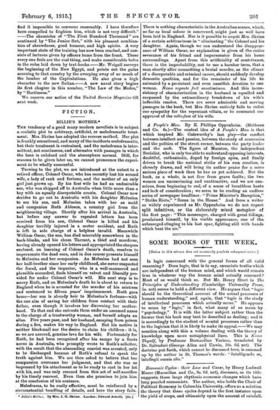A People's Man. By E. Phillips Oppenbeire. (Methuen and Co.
6s.)—The central idea of A People's Man is that which inspired Mr. Galaworthy's last play—the conflict between intellect and passion, between the study of economics and the politics of the street corner, between the party leader and the mob. The figure of Marston, the independent Socialist, who is only too able to understand opposing interests, doubtful, enthusiastic, duped by foreign spies, and finally driven to break the national strike of his own creation, is cleverly drawn, and will bring its author praise for a more serious piece of work than be has as yet achieved. But the book, as a whole, is not free from grave faults ; the two women are unconvincing and unattractive, and we are con- scious, from beginning to end, of a sense of breathless baste and lack of consideration; we seem to be reading an endless series of newspaper headlines "Prime Minister's Reception," "Strike Riots," "Scene in the House." And from a writer so widely experienced as Mr. Oppenheim we do not expect split infinitives, or the elaborately mixed metaphor of the first page : "This messenger, charged with great tidings, proclaimed himself, by his visible appearance, one of the submerged clinging to his last spar, fighting still with Lands which beat the air."






































 Previous page
Previous page